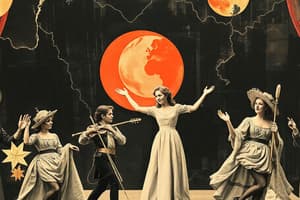Podcast
Questions and Answers
What is the definition of style?
What is the definition of style?
The word used to describe how an artist imitates reality
Which of the following are among the Six Theatrical Styles? (Select all that apply)
Which of the following are among the Six Theatrical Styles? (Select all that apply)
- Surrealism (correct)
- Romanticism (correct)
- Realism (correct)
- Impressionism
Match the theatrical style with its description:
Match the theatrical style with its description:
Realism = Shows the world through a scientist's eye, emphasizing evaluation by appearance and familiarity. Expressionism = Depicts violent and extreme emotions through the eyes of the central character. Classicism = Truth learned through reason, moderation, and balance. Romanticism = Belief in beauty and elegance, often set in historical or mythical contexts.
What is Objective Reality in the context of theatrical styles?
What is Objective Reality in the context of theatrical styles?
What does Subjective Reality consist of?
What does Subjective Reality consist of?
What characterizes Idealized Reality?
What characterizes Idealized Reality?
How does Theatricalism represent reality?
How does Theatricalism represent reality?
What is the primary emotion expressed in Expressionism?
What is the primary emotion expressed in Expressionism?
What are the five traits of Surrealism?
What are the five traits of Surrealism?
Define Causal Logic.
Define Causal Logic.
Define Associative Logic.
Define Associative Logic.
What does Classicism emphasize?
What does Classicism emphasize?
What is Romanticism?
What is Romanticism?
Flashcards are hidden until you start studying
Study Notes
Theatrical Styles Overview
- Theatrical style refers to an artist's method of imitating reality through performance.
Six Theatrical Styles
- Realism: Focuses on depicting everyday life accurately.
- Theatricalism: Highlights the theatrical nature of performance.
- Expressionism: Emphasizes emotional experience over physical reality.
- Surrealism: Explores the subconscious and dream-like imagery.
- Classicism: Advocates for harmony, proportion, and moderation in art.
- Romanticism: Celebrates beauty and idealized portrayals of life.
Grouping of Theatrical Styles
Objective Reality
- Includes Realism and Theatricalism.
- Presents the world through a scientific lens, emphasizing familiar appearances.
Subjective Reality
- Combines Expressionism and Surrealism.
- Reveals the artist’s emotions affecting perceptions of reality and dialogue.
Idealized Reality
- Comprises Classicism and Romanticism.
- Depicts a perfect world shaped by artists' ideals and aspirations.
Objective Reality: Realism
- Dominant theatrical style since 1847, grounded in Determinism.
- Suggests that human nature is shaped by environment and genetics.
- Aims to reflect apparent reality, enabling audience understanding of the truth.
Objective Reality: Theatricalism
- Examines the truth of our world through layers of imitation.
- Breaks conventional theatre norms, including the fourth wall.
- Incorporates narration and pantomime, aligning with Brecht’s Theatre of Alienation.
Subjective Reality: Expressionism
- Emerged in response to oppressive governments and industries.
- Expresses extreme emotions and psychological complexity through characters.
- Utilizes jarring imagery and dialogue steeped in violent themes.
Subjective Reality: Surrealism
- Developed by Antoine Artaud in France.
- Enables subconscious imagery to convey truth, often with whimsical elements.
- Characterized by relaxed space-time, metamorphosis, and associative logic.
Causal Logic
- A relationship where one event directly causes another, e.g., failing a test due to missed classes.
Associative Logic
- Transitions between ideas based on associations rather than direct causation, e.g., linking Idaho with potatoes.
Idealized Reality: Classicism
- Advocates using reason to construct an ideal world with balance and moderation.
- Rejects excess emotions; focuses on proportion in all aspects of life.
Idealized Reality: Romanticism
- Pursues truth through emotions, presenting idealized characters and beautiful narratives.
- Often set in historical or mythical contexts, highlighting adventure and elegance.
Studying That Suits You
Use AI to generate personalized quizzes and flashcards to suit your learning preferences.




